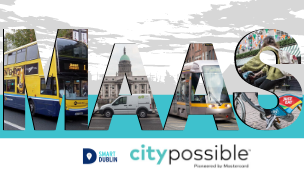Smart Dublin and City Possible, organised a MaaS Gap Analysis Workshop in March in Dublin, Ireland, where a select number of local MaaS stakeholders participated in identifying the characteristics of the current mobility ecosystem, defined what a potential future state MaaS environment should be, and then created and prioritised several initiatives to move Dublin towards a MaaS environment.
The workshop and the resulting report aimed to provide clarity on MaaS, its key stakeholders and primary objectives within the Dublin/Irish context. In doing so, it hopes to encourage a wider discussion about the role that transit agencies – the backbone of mobility – could play in driving MaaS forward and the unique density that only the transit mode brings.
Alan Murphy, Smart Dublin Regional Manager said, “Covid19 presents a unique opportunity to reimagine the mobility landscape; we can go back to the way things were or reimagine the possible. If you want to disrupt complex areas, like mobility, then you have to engage with multiple stakeholders to drive real change. Challenging the status quo via collaboration is how we work at Smart Dublin.”
What is MaaS?
Over the last ten years, several converging market forces, social trends and advancements in technology have started to reshape the way we understand transportation, the way we want to experience it and the way we expect it to be delivered. Once a realm dominated by private vehicles juxtaposed with public transit, today transportation is a much more complex and multi-layered topic, facing new, formidable challenges but also standing on the brink of vast new opportunities.
The Workshop
The workshop was attended by over 30 representatives from national, regional and city level public bodies, as well as the private sector. As part of the workshop, the NTA provided an overview of the Next Generation Ticketing Systems and it was widely acknowledged that this new account based open loop platform would become a central tenet of MaaS in the future.
The workshop was hosted by Andy Taylor who is a Board member of the MaaS Alliance. Andy Taylor said, “I was honoured to be invited to oversee the workshop and was astounded by the passion and thought that was created by the participants. The volume of initiatives is far beyond any that I’ve seen produced by any other workshop I’ve facilitated.”
At the workshop, participants identified a total of 176 initiatives. Participants then reviewed and prioritised 23 of those initiatives across areas of policy, organisation, education, study, technology and data.

Will Judge, VP for Mobility at Mastercard City Possible and sponsoring the event said “Dublin has shown itself to be a pioneer and leader in all aspects of developing smart city solutions. We were pleased to host the event at our Mastercard Labs facility in Dublin that will be expanded in the coming months to make Dublin a Centre of Excellence for smart city developments for the world.”
The intended impact of this report is to identify the benefits desired, key stakeholders required, and roadmap for implementation of MaaS for Dublin. The report is now for consideration by relevant stakeholders with a view to the initiation of a MaaS programme for Dublin/Ireland.
Andy Taylor also said, “The MaaS Alliance is a great supporter of Smart Dublin and we have identified several areas where we can provide information and insights as needed to help deliver MaaS for Dublin.”
Resources: